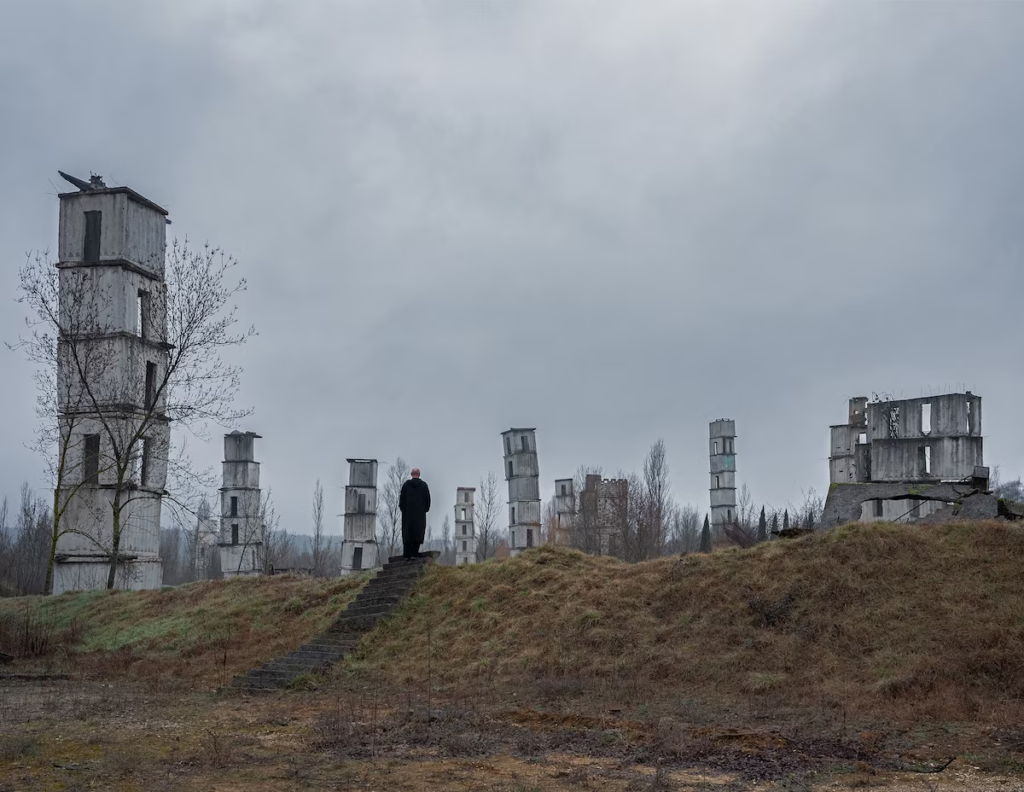An art documentary by Wim Wenders steps inside the work of a man who says his art is about ‘the open wound of German history’
Review by Mark Jenkins
The Washington Post
January 1, 2024 at 7:00 a.m. EST

Artist Anselm Kiefer on the grounds of his studio compound in a scene from the documentary “Anselm.” (Janus Films)
(3 stars)
Born two months before the Nazis surrendered, celebrated German artist Anselm Kiefer grew up amid his homeland’s rubble, both actual and figurative. Destruction still compels and even delights him, as Wim Wenders demonstrates in his epic 3D documentary “Anselm.” The filmmaker (who’s a month younger than Kiefer) observes as the artist attacks his huge sculptural paintings with a blowtorch and splashes them with molten lead. Standing nearby is one of many assistants, ready with a water hose.
Post-World War II art is known for its massive scale, and no artist of his generation works bigger than Kiefer. He turned his former studio and its grounds in the south of France into a sort of theme park, full of sculptures, excavations and eerily mutated buildings. (This is the setting for Sophie Fiennes’s Kiefer documentary “Over Your Cities Grass Will Grow.”) Now Kiefer works near Paris in a former warehouse so vast that he travels within it by bicycle, and where he uses a motorized lift to reach the upper regions of his immense collage-paintings.
The colossal spaces Kiefer inhabits and transforms are ideal for Wenders’s 3D approach, used previously in his 2011 documentary about dancer-choreographer Pina Bausch. The high-resolution camera tracks around and through Kiefer’s artworks, which even at their flattest are cracked and craggy. Wenders evocatively conveys the sheer physicality of the artist’s work and places the viewer virtually within the maelstrom of creation. It’s a fascinating, if somewhat unnerving, place to be.
The sequences dedicated to Kiefer’s biography and inspirations are less pictorially striking. Wenders offers snatches of the artist’s commentary, both in voice-over and offered directly to the camera, in which he discusses the influence of Romanian Jewish poet (and Holocaust survivor) Paul Celan. Kiefer also talks of Martin Heidegger, the influential German philosopher who was a member of the Nazi Party, although exactly what he thinks of him is unclear.

Artist Anselm Kiefer bicycles through his sprawling studio in a scene from “Anselm.” (Janus Films)
Wenders intersperses snippets of old TV programs that he brings into the format by playing them on vintage TV sets photographed in 3D. In one interview, Kiefer explains that his subject is “the open wound of German history.” Photographs illustrate controversial chapters in the artist’s history, notably his performances in his father’s German Army uniform, in which he gave the Nazi salute (banned in postwar Germany) at locations in France, Italy and Switzerland.
The film’s least effective sequences are lyrical reenactments of moments in Kiefer’s life as a boy and a middle-aged man, linked to the rest of the film by such visual motifs as ruins, sunflowers or palatial rooms. These wordless interludes become more interesting when you know that the actors are genetically connected to the film. They’re Anton Wenders and Daniel Kiefer — the director’s great-nephew and the artist’s son, respectively.
If the mock-historical footage is meant to be mythic, so is all of “Anselm.” The cigar-chomping Kiefer, now 78, is presented as a force of nature, constructing and demolishing with equal bravado. Aside from a few critical remarks on those decades-old TV shows, no one challenges Kiefer’s outlook, method or importance. Neither analysis nor skepticism is on Wenders’s agenda.
Kiefer is among those contemporary artists who embrace their output’s eventual obsolescence. Collages that incorporate ashes, burned straw, scrap wood and dried plant matter can’t be preserved in the manner of oil paintings on canvas, and Kiefer’s earthworks are expected to erode and collapse. Eventually, these creations will come to resemble the wreckage in which the artist grew up. By comparison, 3D digital images are relatively stable. As Kiefer’s monumental art decays, “Anselm” can endure as his memorial.
See the Anselm trailer here.
